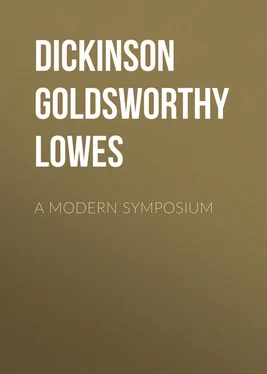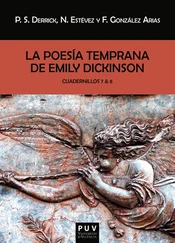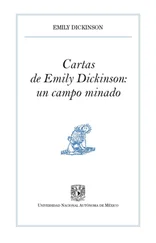Goldsworthy Dickinson - A Modern Symposium
Здесь есть возможность читать онлайн «Goldsworthy Dickinson - A Modern Symposium» — ознакомительный отрывок электронной книги совершенно бесплатно, а после прочтения отрывка купить полную версию. В некоторых случаях можно слушать аудио, скачать через торрент в формате fb2 и присутствует краткое содержание. Жанр: foreign_antique, foreign_prose, на английском языке. Описание произведения, (предисловие) а так же отзывы посетителей доступны на портале библиотеки ЛибКат.
- Название:A Modern Symposium
- Автор:
- Жанр:
- Год:неизвестен
- ISBN:нет данных
- Рейтинг книги:5 / 5. Голосов: 1
-
Избранное:Добавить в избранное
- Отзывы:
-
Ваша оценка:
- 100
- 1
- 2
- 3
- 4
- 5
A Modern Symposium: краткое содержание, описание и аннотация
Предлагаем к чтению аннотацию, описание, краткое содержание или предисловие (зависит от того, что написал сам автор книги «A Modern Symposium»). Если вы не нашли необходимую информацию о книге — напишите в комментариях, мы постараемся отыскать её.
A Modern Symposium — читать онлайн ознакомительный отрывок
Ниже представлен текст книги, разбитый по страницам. Система сохранения места последней прочитанной страницы, позволяет с удобством читать онлайн бесплатно книгу «A Modern Symposium», без необходимости каждый раз заново искать на чём Вы остановились. Поставьте закладку, и сможете в любой момент перейти на страницу, на которой закончили чтение.
Интервал:
Закладка:
"But such measures are exceptional, and we hope they will be final. We take no delight in tinkering the constitution. The mechanism of government we recognize to be only a means; the test of the statesman is his power to govern. And remaining, as we do, inaccessible to that gospel of liberty of which our opponents have had a special revelation, we find in the existing state of England much that appears to us to need control. We are unable to share the optimism which animates Remenham and his friends as to the direction and effects of the new forces of industry. Above the whirr of the spindle and the shaft we hear the cry of the poor. Behind our flourishing warehouses and shops we see the hovels of the artisan. We watch along our highroads the long procession of labourers deserting their ancestral villages for the cities; we trace them to the slum and the sweater's den; we follow them to the poorhouse and the prison; we see them disappear engulfed in the abyss, while others press at their heels to take their place and share their destiny. And in face of all this we do not think it to be our duty to fold our arms and invoke the principle of liberty. We feel that we owe it to the nation to preserve intact its human heritage, the only source of its greatness and its wealth; and we are prepared, with such wisdom as we have, to legislate to that end, undeterred by the fear of incurring the charge of socialism.
"But while we thus concern ourselves with the condition of these islands, we have not forgotten that we have relations to the world outside. If, indeed, we could share the views to which Remenham has given such eloquent expression, this is a matter which would give us little anxiety. He beholds, as in a vision, the era of peace and good-will ushered in by the genius of commerce. By a mysterious dispensation of Providence he sees cupidity and competition furthering the ends of charity and peace. But here once more I am unable to follow his audacious flight. Confined to the sphere of observation, I cannot but note that in the long and sanguinary course of history there has been no cause so fruitful of war as the rivalries of trade. Our own annals at every point are eloquent of this truth; nor do I see anything in the conditions of the modern world that should limit its application. We have been told that all nations will adopt our fiscal policy. Why should they, unless it is to their interest? We adopted it because we thought it was to ours; and we shall abandon it if we ever change our opinion. And when I say 'interest' I would not be understood to mean economic interest in the narrower sense. A nation, like an individual, I conceive, has a personality to maintain. It must be its object not to accumulate wealth at all costs, but to develop and maintain capacity, to be powerful, energetic, many-sided, and above all independent. Whether the policy we have adopted will continue to guarantee this result, I am not prophet enough to venture to affirm. But if it does not, I cannot doubt that we shall be driven to revise it. Nor can I believe that other nations, not even our own colonies, will follow us in our present policy, if to do so would be to jeopardy their rising industries and unduly to narrow the scope of their economic energies. I do not, then, I confess, look forward with enthusiasm or with hope to the Crystal Palace millennium that inspired the eloquence of Remenham. I see the future pregnant with wars and rumours of wars. And in particular I see this nation, by virtue of its wealth, its power, its unparalleled success, the target for the envy, the hatred, the cupidity of all the peoples of Europe. I see them looking abroad for outlets for their expanding population, only to find every corner of the habitable globe preoccupied by the English race and overshadowed by the English flag. But from this, which is our main danger, I conjure my main hope for the future. England is more than England. She has grown in her sleep. She has stretched over every continent huge embryo limbs which wait only for the beat of her heart, the motion of her spirit, to assume their form and function as members of one great body of empire. The spirit, I think, begins to stir, the blood to circulate. Our colonies, I believe, are not destined to drop from us like ripe fruit; our dependencies will not fall to other masters. The nation sooner or later will wake to its imperial mission. The hearts of Englishmen beyond the seas will beat in unison with ours. And the federation I foresee is not the federation of Mankind, but that of the British race throughout the world."
He paused, and in the stillness that followed we became aware of the gathering dusk. The first stars were appearing, and the young moon was low in the west. From the shadow below we heard the murmur of a fountain, and the call of a nightingale sounded in the wood. Something in the time and the place must have worked on Mendoza's mood; for when he resumed it was in a different key.
"Such," he began, "is my vision, if I permit myself to dream. But who shall say whether it is more than a dream? There is something in the air to-night which compels candour. And if I am to tell my inmost thought, I must confess on what a flood of nescience we, who seem to direct the affairs of nations, are borne along together with those whom we appear to control. We are permitted, like children, to lay our hands upon the reins; but it is a dark and unknown genius who drives. We are his creatures; and it is his ends, not ours, that are furthered by our contests, our efforts, our ideals. In the arena Remenham and I must play our part, combat bravely, and be ready to die when the crowd turn down their thumbs. But here in a moment of withdrawal, I at least cannot fail to recognize behind the issues that divide us the tie of a common destiny. We shall pass and a new generation will succeed us; a generation to whom our ideals will be irrelevant, our catch-words empty, our controversies unintelligible.
Hi motus animorum atque haec certamina tanta
Pulveris exigui jactu compressa quiescunt.
"The dust of oblivion will bury our debates. Something we shall have achieved, but not what we intended. My dream may, perhaps, be furthered by Remenham, and his by me, or, it may be, neither his nor mine by either. The Providence whose purposes he so readily divines is dark to me. And perhaps, for that reason, I am able to regard him with more charity than he has always been willing, I suspect, to extend to me. This, at any rate, is the moment of truce. The great arena is empty, the silent benches vanish into the night. Under the glimmer of the moon figures more than mortal haunt the scene of our ephemeral contests. It is they which stand behind us and deal the blows which seem to be ours. When we are laid in the dust they will animate other combatants; when our names are forgotten they will blazon others in perishable gold. Why, then, should we strive and cry, even now in the twilight hour? The same sky encompasses us, the same stars are above us. What are my opinions, what are Remenham's? Froth on the surface! The current bears all alike along to the destined end. For a moment let us meet and feel its silent, irresistible force; and in this moment reach across the table the hand of peace."
With that he stretched his hand to Remenham, with a kind of pathos of appeal that the other, though I think he did not altogether like it, could hardly refuse to entertain. It was theatrical, it was un-English, but somehow, it was successful. And the whole episode, the closing words and the incomparable gesture, left me with a sense as though a curtain had been drawn upon a phase of our history. Mendoza, somehow, had shut out Remenham, even more than himself, from the field on which the issues of the future were to be fought. And it was this feeling that led me, really a little against my inclination, to select as the next speaker the man who of all who, made up our company, in opinions was the most opposed to Remenham, and in temperament to Mendoza. My choice was Allison, more famous now than he was then, but known even at that time as an unsparing critic of both parties. He responded readily enough; and as he began a spell seemed to snap. The night and the hour were forgotten, and we were back on the dusty field of controversy.
Читать дальшеИнтервал:
Закладка:
Похожие книги на «A Modern Symposium»
Представляем Вашему вниманию похожие книги на «A Modern Symposium» списком для выбора. Мы отобрали схожую по названию и смыслу литературу в надежде предоставить читателям больше вариантов отыскать новые, интересные, ещё непрочитанные произведения.
Обсуждение, отзывы о книге «A Modern Symposium» и просто собственные мнения читателей. Оставьте ваши комментарии, напишите, что Вы думаете о произведении, его смысле или главных героях. Укажите что конкретно понравилось, а что нет, и почему Вы так считаете.












